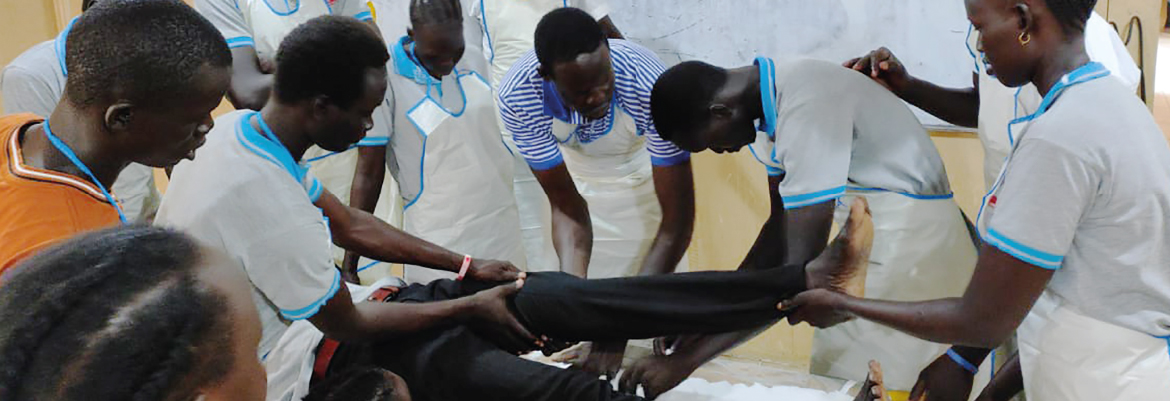With the country more in need of healthcare professionals than ever, the Institute's directors, Drs Anil and Shalini Cherian (a consultant paediatrician and a consultant obstetrician and gynaecologist from India), looked for alternative places to launch the training. They eventually came to an agreement with Mengo Hospital, Kampala, Uganda, and the following summer, students took the long bus journey from Juba to Kampala, and the NIHS began.
Tuor Ghai Mabiei was one of those first students and remembers the turmoil of the time.
'To begin with, I was teaching in a primary school. The application and selection process for the NIHS is what I would name as 'God's call'. I was the last person to submit my application because I got the information one day before the deadline. I had to walk on foot for four hours to Bor Town, where people were applying, and I was lucky to get the last form.'
When the conflict erupted, he moved to another state and lost the contact details to find out the results of his application. Providentially, his brother met a friend in Juba who said Ghai had been successful and needed to get to Juba as soon as possible.
'I went to Juba, where all the successful candidates were waiting. I was lucky to join them before their departure (to Kampala), and I became the last student in the nursing class.'
Kampala was a beautiful and secure place to study, providing ample opportunity to build skills in hospitals and clinics. Also, Anil and Shalini could share the teaching load with health professionals from around the country and even the world who could fly in to train students on various topics. However, it was complicated setting up shop in a different country. A lot of time was spent sorting out visas, accommodation, and helping the students settle in. One example of their teething problems was a timetable clash at Mengo Hospital that meant initially the NIHS could only have classes between 4 and 8 pm.
The first intake of students also took a bit of time to adjust to the new culture in Uganda. Many had never been outside South Sudan before, and one had never owned a pair of shoes! They also had the shadow of war hanging over them, concerned about family and friends back home. Tuor Ghai Mabiei says:
'We were not at peace among ourselves because we left the country due to internal conflict based on tribes, and all the tribes were in the Institute. So it was challenging accepting ourselves for the first months.'
Over the next five years, the Institute got into a rhythm, took on more students and trained 58 men and women to become midwives, clinical officers, and nurses for South Sudan. And also to bear witness to Jesus Christ as they worked. When the first cohort graduated, Dr Anil Cherian told them:
'You are going to find [a] health system which is yet to stabilise. Let the conflict there not destabilise you.'
Even in the face of instability, graduates were extremely committed to returning to work in their home country. As Simon, another graduate of NIHS said:
'I think I'm the third person who was trained as a clinical officer in my area, and I'm very glad to do that...I feel so great to go back to my village.'
After a big celebration, the graduates returned to South Sudan, a country in desperate need of these new health workers. Despite this, many found it difficult to find work.
'It was not easy to get a job because the government hospitals would complain of no vacancies and no budget to employ new staff, so I had to work in a private clinic for four months, which was later closed. Then I had to go back and teach in my primary school until I got employed in 2018 after one year without a medical job.' - Tuor Ghai Mabiei, Nurse.
Once they found a job, graduates of the NIHS faced the same pressures that new health workers experience across the globe:
'On my first day at work, I felt the responsibility of taking care of patients. As a student, you are always working under supervision, but as staff, you take the full responsibility to manage your patients.'- Tuor Ghai Mabiei.
But they also faced the additional pressure of working in an underdeveloped and unstable environment. They experienced a lack of pay, tribal conflict erupting near health clinics, and fellow health workers being killed. Almost all reported a huge shortage of staff and resources. This lack of personnel meant that graduates often rose quickly into senior positions, managing health centres and training others.
One graduate, Rebecca, was shot during her first job and ended up with a broken hand. Today, she continues to serve her people by training Primary Health Care Centre staff and Traditional Birth Attendants with up-to-date midwifery practices.
Another graduate, Angeline, works as a clinical officer in an insecure region of South Sudan and can see over 200 patients a day:
'I love my profession to save lives. That is why I am where I am, far away from my mum. She always told me to leave this place because of insecurity. However, I tell her that God will protect me, and I love my job.'
In 2018, there was a new peace agreement in South Sudan, and the NIHS relocated back to Bor, South Sudan. The new Institute was renamed 'The Jonglei Health Sciences Institute' (JHSI). Everyone was glad to be back in South Sudan. But new challenges soon arose: patchy internet connections, little access to training hospitals and resources, fewer outside teachers, and a greater teaching burden on Anil and Shalini. Then in 2020, the Institute was struck not only by the pandemic but also by floods, making it difficult for students to get to class.
Despite the ongoing challenges of training health workers in South Sudan, Drs Anil and Shalini remain dedicated to training these students, caring for them, and teaching them the Bible, offering weekly Bible studies and annual Bible retreats.
'The best thing I like about the JHSI is the knowledge and skills I acquired from my tutors, Drs Anil and Shalini. The JHSI has provided us with some modern practices and equipment for clinical postings eg how to do blood pressures, use an obstetrics calendar, stethoscopes, and many others, which are very difficult to get in other institutes here in South Sudan…They're not just providing us with medical knowledge but also spiritual growth. This semester, we have learnt from the Gospel of Mark.' - Tereza Jok, student midwife.
Another graduate, David Lado Chance, works in a remote region of South Sudan where fighting still breaks out intermittently. He talks about the difference his training has made:
'Just recently, a neonate was brought in with asphyxia and comatose. The parents were already hopeless, crying for their beautiful and precious baby girl. In the midst of all this, I carefully reflected back to one of the lectures given by Dr Anil Cherian (paediatrician) and was able to follow the correct steps of neonatal resuscitation. The baby breathed again, and the parents were happy.'
Drs Anil and Shalini Cherian have committed almost ten years to training midwives, nurses, and clinical officers for South Sudan. They recognise that the need for health workers is vast. Their vision has always been to expand the training of Christian healthcare professionals. They want to see graduates return to their communities to transform healthcare provision and strengthen the church. So, as we look to the future, we pray for the growth and development of more Christian training centres like this that will impact South Sudan for decades to come.
For more information, please visit the Anglican International Development website: anglicaninternationaldevelopment.org, follow them on social media, or contact simon.tustin@interanglicanaid.org
Alice Caisley is the Communications Manager with Anglican International Development































